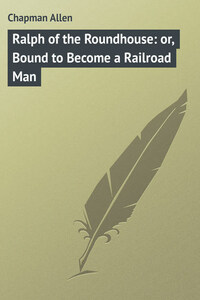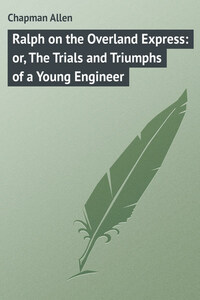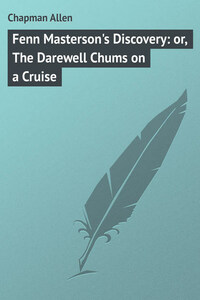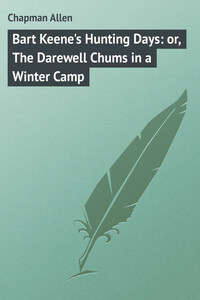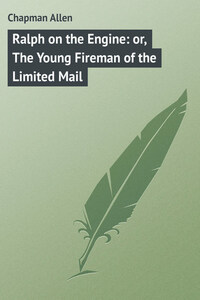CHAPTER I-THE DAYLIGHT EXPRESS
The Daylight Express rolled up to the depot at Stanley Junction, on time, circling past the repair shops, freight yard and roundhouse, a thing of life and beauty.
Stanley Junction had become a wide-awake town of some importance since the shops had been moved there, and when a second line took it in as a passing point, the old inhabitants pronounced the future of the Junction fully determined.
Engine No. 6, with its headlight shining like a piece of pure crystal, its metal trimmings furbished up bright and natty-looking, seemed to understand that it was the model of the road, and sailed majestically to a repose that had something of dignity and grandeur to it.
The usual crowd that kept tab on arriving trains lounged on the platform, and watched the various passengers alight.
A brisk, bright-faced young fellow glided from their midst, cleared an obstructing truck with a clever spring, stood ready to greet the locomotive and express car as they parted company from the passenger coaches, and ran thirty feet along the siding to where the freight-sheds stood.
He appeared to know everybody, and to be a general favorite with every one, for the brakeman at the coach-end air brake gave him a cheery: "Hi, there, kid!" gaunt John Griscom, the engineer, flung him a grim but pleased nod of recognition, and the fireman, discovering him, yelled a shrill: "All aboard, now!"
The young fellow turned to face the latter with a whirl and struck an attitude, as if entirely familiar with jolly Sam Cooper's warnings.
For the latter, reaching for a row of golden pippins stowed on his oil shelf, contributed by some bumpkin admirer down the line, seized the biggest and poised it for a fling.
"Here she goes, Ralph Fairbanks!" he chuckled.
"Let her come!" cried back Ralph, and-clip! he cut the missile's career short by the latest approved baseball tactics.
Ralph pocketed the apple with a gay laugh, and was at the door of the express section of the car as it slid back and the messenger's face appeared.
The agent had come out of his shed. He glanced over an iron chest and some crated stuff shoved forward by the messenger, and then, running his eye over the bills of lading handed him by the latter, said briskly:
"You will not be needed this time, Ralph."
"All right, Mr. More."
"Nothing but some transfer freight and the bank delivery-that's my special, you know. Be around for the 5.11, though."
"Sure," nodded Ralph Fairbanks, looking pleased at the brisk dismissal, like a boy on hand for work, but, that failing, with abundant other resources at hand to employ and enjoy the time.
With a cheery hail to the baggage master as he appeared on the scene, Ralph rounded the cow-catcher, intent on a short cut across the tracks. His appearance had been actuated by business reasons strictly, but, business not materializing, he was quite as practical and eager on another tack.
Ever since vacation began, three weeks previous, Ralph had made two trips daily to the depot, on hand to meet the arriving 10.15 and 5.11 trains.
This had been at the solicitation of the express agent. Stanley Junction was not a very large receiving point, but usually there were daily several packages to deliver. When these were not for the bank or business houses in the near center of the town, but for individuals, the agent employed Ralph to deliver them, allowing him to retain the ten cents fee for charges.
Sometimes Ralph picked up as high as fifty cents a day, the average was about half that amount, but it was welcome pocket money. Occasionally, too, some odd job for waiting passengers or railroad employes would come up. It gave Ralph spending money with which to enjoy his vacation, and, besides, he liked the work.
Especially work around the railroad. What live boy in Stanley Junction did not-but then Ralph, as the express agent often said, "took to railroading like a duck to water."
It was a natural heritage. Ralph's father had been a first-class, all-around railroad man, and his son felt a justifiable pride in boasting that he was one of the pioneers who had made the railroad at Stanley Junction a possibility.
"Home, a quick bite or two, and then for the baseball game," said Ralph briskly, as he ran his eye across the network of rails, and beyond them to the waving tree tops and the village green. Preparing to make a run for it, Ralph suddenly halted.
A grimed repair man, tapping the wheels of the coaches, just then jerked back his hammer with a vivid:
"Hi, you!"
Ralph discerned that the man was not addressing him, for his eyes were staringly fixed under the trucks.
"Let me out!" sounded a muffled voice.
Ralph was interested, as there struggled from the cindered roadbed an erratic form. It was that of a boy about his own age. He judged this from the dress and figure, although one was tattered, and the other strained, crippled and bent. The face was a criss-cross streak of dust, oil and cinders.
"A stowaway!" yelled the repair man, excitedly waving his hammer. "Schmitt! Schmitt! this way!"
